NATO and its peacekeeping force in Kosovo, known by the acronym KFOR, are “very concerned about the security situation and the possibilities of its deterioration” and encourage parties to engage in dialogue to find a political solution, an alliance official said Thursday in Washington, where alliance leaders are meeting to mark its 75th anniversary.
“At NATO, we believe that the solution and stabilization of the security situation in the future will depend entirely on political solutions. We have continuously emphasized the need for EU-mediated dialogue and constructive diplomatic engagement. We have also stressed the need to avoid unilateral actions that could provoke security incidents,” a NATO official told reporters, speaking about the security situation in Kosovo, where NATO has the largest and longest peacekeeping mission in the world, under the condition of not being identified by name.
According to the NATO official, “it is regrettable that engagement in dialogue has not produced agreements or led to deepening the dialogue, implying that tensions on the ground continue to have consequences for security.”
“We continue… to encourage both parties to engage as constructively and beneficially as possible, because the only true solution to the situation is a political one,” he added.
According to the official, NATO peacekeepers in Kosovo have increased their capacities, raising the number of soldiers from 3700 to 4600 peacekeepers, marking the largest increase of NATO forces in Kosovo since its independence declaration in 2008. As part of other specific measures, according to the official, NATO troops have also quadrupled their presence in northern Kosovo and tripled patrols along the border line between Kosovo and Serbia.
These enhanced security measures were taken as a result of escalated security in northern Kosovo, particularly after violent protests that left over 90 KFOR soldiers injured on May 29 in clashes with groups of Serbian protesters opposing the implementation of boycotted local election results by Serbian political parties. Violence erupted after Kosovo authorities escorted municipal leaders with police forces to their offices, despite Western calls to avoid such actions.
The situation in Kosovo further escalated on September 24 when a police officer was killed and at least two others were injured during clashes with an armed group of Serbs in the predominantly Serbian-populated village of Banjska. Three members of the armed Serb group were killed during the day-long clashes, raising concerns about stability in the fragile region.
A large amount of weaponry was confiscated during this incident, for which Kosovo blamed Serbia, accusations Belgrade dismissed, stating that the group consisted of Kosovo Serb citizens revolted by Pristina’s approach.
These security incidents were followed by concerns raised by the United States about increased Serbian military buildup on the Kosovo border and Serbia’s urgent request to withdraw forces from the border.
Regarding these security incidents, the official said NATO continues to urge “both parties to treat these situations with the utmost seriousness, especially regarding responsibility.”
“It is very important for NATO, not only because our soldiers were injured on May 29, but because accepting responsibility is part of moving forward in this political process. All parties must feel that they have responsibility and also feel that their voice is being heard, so that we can move towards a sustainable solution,” the official stated.







